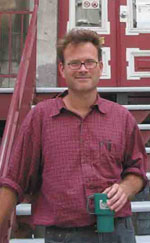GSA starts year with conference on teaching assistants, research

David Bernans on the steps of the GSA building at 2030 MacKay.
Photo by Lina Shoumarova
Expect more activities from the Graduate Students Association (GSA) this year. Its new president, David Bernans, will make it his priority to reach out and get people involved.
Since it took over June 1, the new GSA executive has been busy organizing orientation events. Among them is a new conference titled Graduate Student Contributions to Education and Research, to take place Sept. 16 to 18 on the SGW campus.
“I want to give the graduate student community the kind of political debate they haven’t had in the past, but I don’t see my role as injecting politics into the GSA. As an executive, we’ll follow whatever our members tell us.”
Bernans and his team of four vice-presidents inherited a GSA that is more stable and financially viable than it had been four years ago when former president Rocci Luppicini took office.
“When I started in 2001,” Luppicini explained, “the GSA was bankrupt, with an $80,000-plus debt accrued over a decade and the university requesting that the GSA give up its internal account it was that bad! The GSA was almost dead.
“Over the past four years we managed to eliminate the entire debt, double the operating budget, and create the first campus-wide graduate student publication. Our strategy was simply hard work, and I’d like to think I played a small part in helping the GSA restabilize itself.”
The former GSA executive established contact with other graduate students organizations in Canada. They created the R/Evolutions graduate conference and the Halloween party and made them annual events. In 2001, they also opened the Graduate Student Resource and Communication Centre, providing students with academic writing support and library services.
Bernans sees his work as strengthening what has been achieved so far, and tackling some other important issues, such as increasing voting turnout. Only about 350 people voted during the last elections, held in March. Bernans said the GSA executive is looking into introducing online voting.
Understanding Concerns
Another challenge will be to deal with issues regarding the work and remuneration of teaching and research assistants. “The first order of business is to really understand what the different graduate students’ concerns are. There isn’t a standard way for organizing the work, so working conditions vary widely from faculty to faculty.
“One of the reasons it is so difficult to get a handle on the issue is because the problems are not the same for everyone,” Bernans explained.
He is hoping also that the GSA will forge stronger links with the other student organizations on campus. The association welcomes participation of all graduate students. They can get involved in the GSA council or in one of the committees. They can also apply for some of the paid jobs at the GSA.
Bernans knows Concordia well. He has worked for the university as a part-time faculty member in the Political Science Department and as an archivist and researcher for the Concordia Student Union (CSU), a job he keeps.
He said he doesn’t see a conflict of interest in being involved with the GSA and CSU simultaneously, because “there is a lot that graduate and undergraduate students have to work on together.”
Bernans is a part-time student in the Graduate Diploma in Translation in Études françaises. He also holds a PhD in political science from York University.